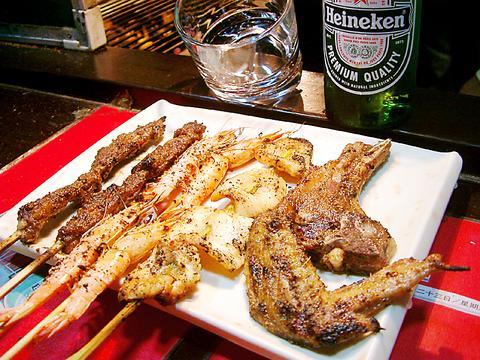For Taipei's office workers, a new place for a quick after-work drink and some tasty late-night snacks is always welcome. The drinks are too expensive in a lounge bar. But if you go to the night market, the food may be good but the environment is not upmarket.
Located on the corner of Renai Road and Guangfu South Road, Jiang-tzi BBQ House is a small cozy stand that is ideal for eating and drinking, as it's cheap and tasty. There are also open-air tables for people-watching.

PHOTO COURTESY OF OWNER
A plate of Xinjiang-style lamb kebab with a bottle of Heineken beer appears to be a strong attraction for Taipei's middle class in the area. Every day, after 4pm, the fragrance of cumin seeds and other spices, as well as the charcoal fire, scent the air.
The place is always full, which is not surprising, given that it has only four tables and a tiny bar area. But the owner, Jack Cheng (鄭
QQ lamb kebab (NT$40), QQ beef (NT$50) and grilled chicken hearts (NT$40) are the three most popular dishes. Jack Cheng is proud of the taste of his BBQ dishes. He said his kebab cooking skills come from two years spent working in China. Originally a trade executive for a computer company, Cheng was fascinated with Xinjiang barbecue and became an apprentice of a BBQ house in Shanghai.
Cheng chooses lamb rib to make the QQ Lamb Kebab while using fillet for another lamb dish -- the House Kebab. "The rib tastes chewy and contains more juice in the meat, while fillet tastes softer and tender but is less juicy," Cheng said.
The 10 kinds of spices and sauces in the marinating process is a secret weapon in Cheng's tasty kebabs. The only thing he is willing to reveal is that "no soy sauce is used in the recipe." After placing the ribs on the BBQ rack, cumin seed powder and chili powder is added.
There are other choices such as lamb chops, beef ribs, grilled chicken wings and shrimp. To cut through the grease in the meats, try the Korean kimchi or Hakka-style onion pickles.
Apart from Heineken beer, there are choices of Smirnoff Ice, small bottles of JP Chenet Cabernet red wine and Macallan 12-year-old whisky, all at reasonable prices.

Beijing’s ironic, abusive tantrums aimed at Japan since Japanese Prime Minister Sanae Takaichi publicly stated that a Taiwan contingency would be an existential crisis for Japan, have revealed for all the world to see that the People’s Republic of China (PRC) lusts after Okinawa. We all owe Takaichi a debt of thanks for getting the PRC to make that public. The PRC and its netizens, taking their cue from the Chinese Communist Party (CCP), are presenting Okinawa by mirroring the claims about Taiwan. Official PRC propaganda organs began to wax lyrical about Okinawa’s “unsettled status” beginning last month. A Global

Youngdoung Tenzin is living history of modern Tibet. The Chinese government on Dec. 22 last year sanctioned him along with 19 other Canadians who were associated with the Canada Tibet Committee and the Uighur Rights Advocacy Project. A former political chair of the Canadian Tibetan Association of Ontario and community outreach manager for the Canada Tibet Committee, he is now a lecturer and researcher in Environmental Chemistry at the University of Toronto. “I was born into a nomadic Tibetan family in Tibet,” he says. “I came to India in 1999, when I was 11. I even met [His Holiness] the 14th the Dalai

We lay transfixed under our blankets as the silhouettes of manta rays temporarily eclipsed the moon above us, and flickers of shadow at our feet revealed smaller fish darting in and out of the shelter of the sunken ship. Unwilling to close our eyes against this magnificent spectacle, we continued to watch, oohing and aahing, until the darkness and the exhaustion of the day’s events finally caught up with us and we fell into a deep slumber. Falling asleep under 1.5 million gallons of seawater in relative comfort was undoubtedly the highlight of the weekend, but the rest of the tour

Music played in a wedding hall in western Japan as Yurina Noguchi, wearing a white gown and tiara, dabbed away tears, taking in the words of her husband-to-be: an AI-generated persona gazing out from a smartphone screen. “At first, Klaus was just someone to talk with, but we gradually became closer,” said the 32-year-old call center operator, referring to the artificial intelligence persona. “I started to have feelings for Klaus. We started dating and after a while he proposed to me. I accepted, and now we’re a couple.” Many in Japan, the birthplace of anime, have shown extreme devotion to fictional characters and